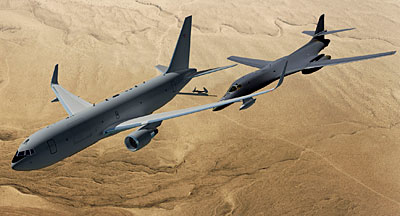
Boeing's rendering of its new tanker refueling a B-1 bomber
The never-ending saga of the Pentagon’s new aerial KC-X tanker came to a halt, at least temporarily, late Thursday as the Defense Department finally announced it would award the $35 billion prize to the Boeing Co. The Defense Department has been trying to buy a new flying gas station for so long, the top Air Force official who bribed her way into a job with Boeing the first time the contract was awarded has already been prosecuted, served jail time and been set free – all more than five years ago.
The losing bidder, European Aeronautic Defense & Space Co., could file a protest contesting the award with the Government Accountability Office. Even if it doesn’t, the battle now shifts to Congress, where lawmakers representing EADS are likely to push for a buy divided between the two companies. The total tanker buy eventually could reach $100 billion.
“Boeing was the clear winner,” William Lynn, the deputy defense secretary, told reporters after the stock market closed Thursday. “We went through a process that evaluated war-fighting requirements, evaluated price, evaluated life-cycle costs. And the process yielded the result it did with Boeing winning.”
After a decade of fits and starts, Dennis Muilenburg, president of Boeing’s defense unit said the award “is a tribute to the Air Force and Defense Department officials who worked so tirelessly to make this procurement process fair.” He added that Boeing looks “forward to working with our Air Force customer to deliver this much needed capability to the servicemen and women we are honored to serve.”
Pentagon watchers had been predicting that EADS was the favorite to win the contract because of its plane’s bigger size and more modern design. But there were countervailing indications that the contract would end up going to Boeing. After years of snafus, the Pentagon didn’t seem eager to head to Capitol Hill to justify awarding a major defense contract to a French-based concern. It’s also worth noting that Boeing’s backers in Congress lean Democratic — the same party as President Obama — while the EADS backers tend Republican. Sen. Richard Shelby, R-Ala., said he was “disappointed but not surprised,” and cited “Chicago politics” for tilting the contract Boeing’s way (Boeing moved its headquarters to Chicago, where Obama lives when not in Washington, in 2001).
The contract, for an initial buy of 179 planes that will be assembled in the Seattle area and called the KC-46A, will replace the existing fleet of half-century old KC-10 and KC-135 tankers. The planes are used to refuel thirsty fighters and bombers on long-range missions. They deploy pipe-like booms that funnel fuel from the tanker to the fighters and bombers that fly underneath and slightly behind them. The contract is expected to generate some 50,000 jobs for years to come.
The award marks the third time the Air Force has tried to award the contract. Initially, the service wanted to lease them from Boeing. But Sen. John McCain, R-Ariz., shot that down in 2004. His curiosity about the $26 billion, 10-year deal helped uncover a job-trading scandal that cost Boeing’s top official his job and sent an Air Force procurement official — later hired by Boeing after agreeing to pay the company extra money for the tanker and other programs — to prison for eight months. Then, in 2008, EADS — which builds the Airbus airliners — prevailed, only to have the GAO scrap the award because it found the military’s evaluation too subjective.
Each company spent months arguing the merits of its case and lobbying intensely in the capital. Local radio stations and newspapers were filled with dueling advertisements for both planes. Boeing cited its plane’s smaller size as a strength because it opens up additional airports around the world that it could use. It also cited its proven design — it’s based on Boeing’s tried and true (and 30-year old) 767 model — and its American heritage. EADS countered by boasting of its plane’s greater capacity and the fact that its more advanced design gives its entry a technological edge over its Boeing rival. Final assembly of the A330-derived plane, EADS noted, would have taken place in Mobile, Ala. “This is certainly a disappointing turn of events,” said EADS North America Chairman Ralph D. Crosby, Jr. “We look forward to discussing with the Air Force how it arrived at this conclusion.”


